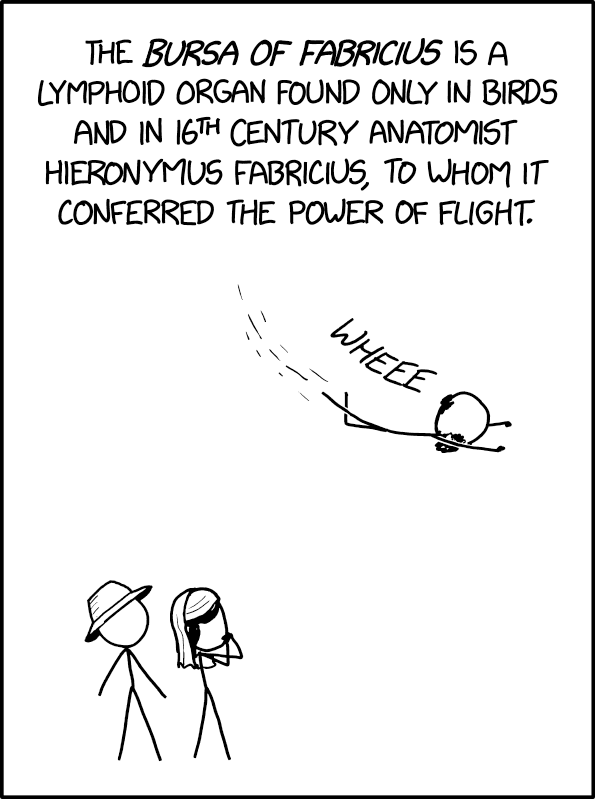Named anatomy
Today's xkcd:
Mouseover title: "If an anatomical structure is named for a person, it means they were the only person to have it. Pierre Paul Broca had a special area of his brain that created powerful magnetic fields, enabling him to do 19th century fMRI research."
Read the rest of this entry »
Japanese proverbial wisdom of the ages
Article by Richard Medhurst:
"Dust into Mountains: Patience and Perseverance in Japanese Proverbs", Nippon.com (1/27/23)
Eleven items in three categories
————————-
Strive Another Day
七転び八起き — Nana korobi ya oki. To “fall seven times and get up eight” means to remain unbowed despite repeated failure, and keep striving to achieve something. The phrase is often associated with the round red-and-white figures of Daruma (Bodhidarma), the Buddhist monk whose steadfast meditation led to the withering of his arms and legs.
石の上にも三年 — Ishi no ue ni mo san nen. Sit “on a stone for three years” and finally one can warm it up, in this saying encouraging endurance.
塵も積もれば山となる — Chiri mo tsumoreba yama to naru. “If dust piles up, it will become a mountain.” In other words, many small actions continued over time can lead to unexpectedly large and significant results.
待てば海路の日和あり — Mateba kairo no hiyori ari. “Wait and fine weather will come on the sea routes.” If the outlook is stormy now, it is better to wait for the right conditions than take immediate action.
Read the rest of this entry »
Ashkenazi click sounds, part 2
Following up on their query which formed the basis for "Ashkenazi click sounds" (1/27/23), Dana F. appends this additional valuable information:
Benor lists several features that make all Orthodox speech special, such as a high number of loanwords from Hebrew and Yiddish, far more than are found in the vocabulary of non-Orthodox American Jews; Yiddish-influenced phrasing, as in English sentences like “I want you should come right away” or “We’re staying by my in-laws on Shabbos,” and Yiddish-influenced phonetic deviations, such as a full “t”-sound at the end of words and syllables. (An example of this would be saying “right” with the same “t” as is heard in “today,” as opposed to the partially swallowed or glottalized final “t” of American English.)
Two other peculiarities complete Benor’s list. One is a singsong “talmudic” intonation, particularly in sentences with logical reasoning expressed in dependent clauses like, “If you were going to the grocery anyway, why didn’t you buy some bread?” The other is what Benor calls a “hesitation click” — a “tsk”-sound used, like “um,” to give the speaker time to think of what to say next. (Although she is no doubt correct in ascribing this to Israeli influence, she errs in thinking that it is used this way in Israeli Hebrew. The Israeli “tsk” simply means “No,” although when occurring in midsentence in what Binor rightly calls a “corrective click,” this “no” can have the sense of, “On second thought, that isn’t what I really wanted to say, so I’ll try to say it again.” This is probably how, misinterpreted by Orthodox American Jews exposed to Israeli speech, it became an American Jewish “hesitation click.”)
This gives some context to the origin, although it does not explain how the meaning of the click evolved from Hebrew ("no") to simply a filler word that is used, in my experience, multiple times per sentence.
Read the rest of this entry »
The French?
Roger Cohen, "The French Want to Remain The French", NYT 1/27/2023:
As an exercise in style, the tweet from The Associated Press Stylebook appeared to strain taste and diplomacy: “We recommend avoiding general and often dehumanizing ‘the’ labels such as the poor, the mentally ill, the French, the disabled, the college educated.”
At least it looked offensive to the French, or perhaps rather to people of Frenchness, or people with Gallic inclinations, or people under the influence of French civilization. The French noted that they had been placed between the “mentally ill” and the “disabled.”
Read the rest of this entry »
Neologisms for the Anthropocene
Article by Richard Fisher in BBC (1/26/23):
Why we need new words for life in the Anthropocene
The Bureau of Linguistical Reality is assembling a new lexicon for people's experience of climate change and environmental upheaval, writes Richard Fisher.
The beginning paragraphs read thus:
One day, Harold Antoine Des Voeux realised he lacked a word. It was the beginning of the 20th Century, and the doctor had been treating multiple people for lung ailments. Gradually, he figured out the reason for the excess illness he was seeing: it was the air pollution caused by nearby factories burning so much coal. In one 1909 incident that affected Glasgow, more than 1,000 people had died.
Read the rest of this entry »
Cursive and memory
Anne Thomas, a retired primary school teacher, writes from NH:
While it may not be required coursework across the board, cursive is making a comeback. Research shows that handwriting notes activates multiple brain regions associated with optimal memory, much more so than note-taking with digital devices. Taking notes by hand or writing a to-do list on paper will preserve that memory a lot longer than typing into a laptop or phone.
As of February 2022, 14 states passed legislation requiring cursive to be taught in schools, with legislation pending elsewhere. Educators argue that such instruction is essential to developing fine motor skills.
Read the rest of this entry »
Ashkenazi click sounds
Dana F. writes:
I am a long-time reader of Language Log and was wondering if you might do a post on the linguistic origin of Ashkenazi Jewish Orthodox Jews (specifically from communities in New York) and their habit of making clicking noises with their tongue as a filler when speaking. I don't believe this habit comes from Hebrew or German origins (as far as I know) and I am very curious about it. I thought it might be an interesting topic for Language Log. Thank you very much!
Read the rest of this entry »
The role of long-distance communication in human history
If one has a knee-jerk reaction to attribute all distant cultural resemblances to chance coincidence (independent invention), that would be to make a mockery of human mobility and adaptability. It would be as if people never deigned or had the opportunity to borrow something from another group.
I can give hundreds of long distance cultural correspondences that could not possibly have been due to chance coincidence — so complicated, intricate, and exact are they, especially when accompanied by textual, artistic, and other types of evidence, much of it hard / material. Moreover, we often have the bodies and the goods and the words — at transitional stages and times — to go along with the transmission. For some examples, see the "Selected readings" below. Many more could be adduced.
Read the rest of this entry »
GLM-130B: An Open Bilingual Pre-Trained Model
Description of a General Language Model (GLM; also GLaM) project based at Tsinghua University in Beijing, but with users and collaborators around the world.
Homepage (August 4, 2022)
This prospectus is difficult for outsiders to understand because of the large number of unexplained acronyms, abbreviations, initialisms, etc. and other such participants' terminology.
GLM-130B is an open bilingual (English & Chinese) bidirectional dense model with 130 billion parameters, pre-trained using the General Language Model (GLM) algorithm1. It is designed to support inference tasks with the 130B parameters on a single A100 (40G * 8) or V100 (32G * 8) server. As of July 3rd, 2022, GLM-130B has been trained on over 400 billion text tokens (200B each for Chinese and English) and exhibits the following unique features:
-
- Bilingual: supports both English and Chinese.
- Performance (EN): better than GPT-3 175B (+5.0%), OPT-175B (+6.5%), and BLOOM-176B (+13.0%) on LAMBADA and slightly better than GPT-3 175B (+0.9%) on MMLU.
- Performance (CN): significantly better than ERNIE TITAN 3.0 260B on 7 zero-shot CLUE datasets (+24.26%) and 5 zero-shot FewCLUE datasets (+12.75%).
- Fast Inference: supports fast inference on both SAT and FasterTransformer (up to 2.5X faster) with a single A100 server.
- Reproducibility: all results (>30 tasks) can be easily reproduced with open-sourced code and model checkpoints.
- Cross-Platform: supports training and inference on NVIDIA, Hygon DCU, Ascend 910, and Sunway.
The model checkpoints of GLM-130B and code for inference are publicly available at our GitHub repo. The code for pre-training and fine-tuning as well as the research paper are coming soon.
Read the rest of this entry »
Permalink Comments off
Whose New Year is it anyway?
The struggle for cultural priority, supremacy, and naming between China and Korea is perennial: fishing nets, printing with metal movable type, kimchi…. Now it's over the lunar new year that is currently being celebrated.
"NewJeans' Danielle apologizes for calling the 'Lunar New Year' 'Chinese New Year'"
Yaki-Jones, allkpop (1/21/23)
Yaki-Jones, allkpop (1/22/23)
Might be better to avoid the orthological controversy altogether and just refer to it as the Lunar New Year.
Read the rest of this entry »
The difficulty of expressing "nothing"
This is a clever attempt to write a spring couplet (chūnlián 春聯), not in the usual Sinoglyphs / Chinese characters, but in pictographs:

(source)
Read the rest of this entry »


